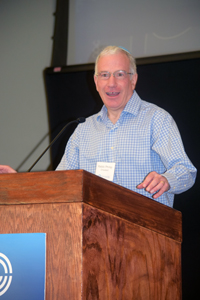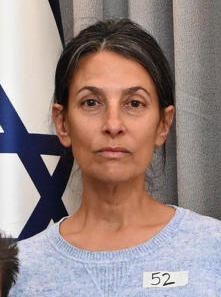By Rabbi Philip Graubart


(Photo: Haim Zach / GPO)
LA JOLLA, California — I don’t know why at first I didn’t notice the similarity between Rachel Goldberg-Polin, mother of the murdered hostage Hersh Polin, and the matriarch Rachel. After all, both Rachels cry for their children, and no one I can remember comes closer to being a matriarch to the Jewish people than Hersh’s mother. Probably I didn’t connect them because the matriarch Rachel is famous for her weeping, while Rachel Polin almost always displayed a steely courage. Much of America witnessed that quality with her speech at the Democratic National Convention. No tears, but an intense moral charge that captivated the entire country.
Until the tears came, as they had to. If she broke our hearts with her speech, her collapse into tears afterwards ripped our hearts out. It happened again at Hersh’s funeral (a ceremony that, like most of us, I didn’t want to watch, but of course I had to). First a loving, determined tribute. Then, again inevitably, tears breaking loose on the last word. She became the biblical mother, Rachel, “Rachel weeping for her children. She refuses to be comforted for her children, who are gone.”
“Refuses to be comforted.” A familiar feeling for almost everyone I know in the aftermath of these horrific, senseless murders. Colleagues and I – retired American rabbis – bemoan a wound that will never heal. How long will this war go on? We wonder. How much can Israel take? How much can we all take? We worry about the hundreds of thousands of Israel’s inner refugees, of the fissures in American Judaism because of the war, campus demonstrators that revere and mimic Hamas terrorists. Rachel’s tears mesmerize us with their power and tragic depth.
But there’s a duality to tears. Tears can signal or trigger depression, or a destructive despair. They can also provide healing, and a renewed sense of purpose and commitment. Often, we feel drained and empty after crying. But sometimes we feel better. We see this in an utterly fascinating rabbinic Midrash, where God threatens to cry over the destruction of Jerusalem by the Babylonians. The angel Metatron becomes so alarmed at the prospect of God weeping that he begs God to let him take on all the sorrow of the Temple’s destruction. But God insists that if He is not allowed to cry in His private space, his divine tears will flood the world. Later God commands the prophet Jeremiah to summon Abraham, Isaac, and Jacob from their graves “because they know how to weep.” Each of the three patriarchs then tries to persuade God to reverse the decree, but they fail. Then the matriarch Rachel appears, and it’s her tears that transform God’s verdict. “Restrain your voice from weeping,” God says, “your eyes from shedding tears; For there is a reward for your groaning. . .they shall return from the enemy’s land.”
I can only pray that Rachel Goldberg-Polin’s desperate tears at her son’s funeral are of the type that conceal the seeds of their own redemption. No one more than her deserves to cry and then to heal. I know that the new year is coming, with its promise of new mornings, new blessings. Perhaps our collective tears will steel us in determination to continue the work of Zionism and building a Jewish people that remains a source of blessing. In other words, my prayer is that we show courage, in memory of Hirsh, and in tribute to the brave woman who for a moment was mother to us all.
*
Rabbi Philip Graubart is the former spiritual leader of Congregation Beth El in La Jolla.
Thank you, Rabbi Graubart. Your thoughts and words mean so much.
My family, Hezroni family, was murdered and burned in their house in Kibbutz BeEri…it’s a sad and tragic story. for all of us…
I lost my 30 year old son, Eli, 6 and Half years ago…it’s as painful today as it was the day he was taken from me. A mothers mourning and love is always
there.